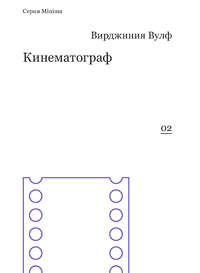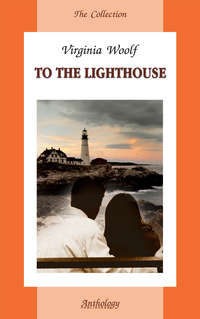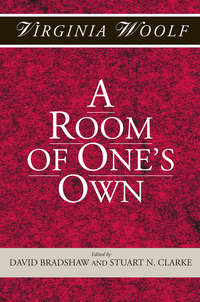 полная версия
полная версияThe Voyage Out
"She was quite nice, but a thimble-pated creature," Helen continued. "I never heard such nonsense! Chitter-chatter-chitter-chatter – fish and the Greek alphabet – never listened to a word any one said – chock-full of idiotic theories about the way to bring up children – I'd far rather talk to him any day. He was pompous, but he did at least understand what was said to him."
The glamour insensibly faded a little both from Richard and Clarissa. They had not been so wonderful after all, then, in the eyes of a mature person.
"It's very difficult to know what people are like," Rachel remarked, and Helen saw with pleasure that she spoke more naturally. "I suppose I was taken in."
There was little doubt about that according to Helen, but she restrained herself and said aloud:
"One has to make experiments."
"And they were nice," said Rachel. "They were extraordinarily interesting." She tried to recall the image of the world as a live thing that Richard had given her, with drains like nerves, and bad houses like patches of diseased skin. She recalled his watch-words – Unity – Imagination, and saw again the bubbles meeting in her tea-cup as he spoke of sisters and canaries, boyhood and his father, her small world becoming wonderfully enlarged.
"But all people don't seem to you equally interesting, do they?" asked Mrs. Ambrose.
Rachel explained that most people had hitherto been symbols; but that when they talked to one they ceased to be symbols, and became – "I could listen to them for ever!" she exclaimed. She then jumped up, disappeared downstairs for a minute, and came back with a fat red book.
"Who's Who," she said, laying it upon Helen's knee and turning the pages. "It gives short lives of people – for instance: 'Sir Roland Beal; born 1852; parents from Moffatt; educated at Rugby; passed first into R.E.; married 1878 the daughter of T. Fishwick; served in the Bechuanaland Expedition 1884-85 (honourably mentioned). Clubs: United Service, Naval and Military. Recreations: an enthusiastic curler.'"
Sitting on the deck at Helen's feet she went on turning the pages and reading biographies of bankers, writers, clergymen, sailors, surgeons, judges, professors, statesmen, editors, philanthropists, merchants, and actresses; what clubs they belonged to, where they lived, what games they played, and how many acres they owned.
She became absorbed in the book.
Helen meanwhile stitched at her embroidery and thought over the things they had said. Her conclusion was that she would very much like to show her niece, if it were possible, how to live, or as she put it, how to be a reasonable person. She thought that there must be something wrong in this confusion between politics and kissing politicians, and that an elder person ought to be able to help.
"I quite agree," she said, "that people are very interesting; only – " Rachel, putting her finger between the pages, looked up enquiringly.
"Only I think you ought to discriminate," she ended. "It's a pity to be intimate with people who are – well, rather second-rate, like the Dalloways, and to find it out later."
"But how does one know?" Rachel asked.
"I really can't tell you," replied Helen candidly, after a moment's thought. "You'll have to find out for yourself. But try and – Why don't you call me Helen?" she added. "'Aunt's' a horrid name. I never liked my Aunts."
"I should like to call you Helen," Rachel answered.
"D'you think me very unsympathetic?"
Rachel reviewed the points which Helen had certainly failed to understand; they arose chiefly from the difference of nearly twenty years in age between them, which made Mrs. Ambrose appear too humorous and cool in a matter of such moment.
"No," she said. "Some things you don't understand, of course."
"Of course," Helen agreed. "So now you can go ahead and be a person on your own account," she added.
The vision of her own personality, of herself as a real everlasting thing, different from anything else, unmergeable, like the sea or the wind, flashed into Rachel's mind, and she became profoundly excited at the thought of living.
"I can by m-m-myself," she stammered, "in spite of you, in spite of the Dalloways, and Mr. Pepper, and Father, and my Aunts, in spite of these?" She swept her hand across a whole page of statesmen and soldiers.
"In spite of them all," said Helen gravely. She then put down her needle, and explained a plan which had come into her head as they talked. Instead of wandering on down the Amazons until she reached some sulphurous tropical port, where one had to lie within doors all day beating off insects with a fan, the sensible thing to do surely was to spend the season with them in their villa by the seaside, where among other advantages Mrs. Ambrose herself would be at hand to – "After all, Rachel," she broke off, "it's silly to pretend that because there's twenty years' difference between us we therefore can't talk to each other like human beings."
"No; because we like each other," said Rachel.
"Yes," Mrs. Ambrose agreed.
That fact, together with other facts, had been made clear by their twenty minutes' talk, although how they had come to these conclusions they could not have said.
However they were come by, they were sufficiently serious to send Mrs. Ambrose a day or two later in search of her brother-in-law. She found him sitting in his room working, applying a stout blue pencil authoritatively to bundles of filmy paper. Papers lay to left and to right of him, there were great envelopes so gorged with papers that they spilt papers on to the table. Above him hung a photograph of a woman's head. The need of sitting absolutely still before a Cockney photographer had given her lips a queer little pucker, and her eyes for the same reason looked as though she thought the whole situation ridiculous. Nevertheless it was the head of an individual and interesting woman, who would no doubt have turned and laughed at Willoughby if she could have caught his eye; but when he looked up at her he sighed profoundly. In his mind this work of his, the great factories at Hull which showed like mountains at night, the ships that crossed the ocean punctually, the schemes for combining this and that and building up a solid mass of industry, was all an offering to her; he laid his success at her feet; and was always thinking how to educate his daughter so that Theresa might be glad. He was a very ambitious man; and although he had not been particularly kind to her while she lived, as Helen thought, he now believed that she watched him from Heaven, and inspired what was good in him.
Mrs. Ambrose apologised for the interruption, and asked whether she might speak to him about a plan of hers. Would he consent to leave his daughter with them when they landed, instead of taking her on up the Amazons?
"We would take great care of her," she added, "and we should really like it."
Willoughby looked very grave and carefully laid aside his papers.
"She's a good girl," he said at length. "There is a likeness?" – he nodded his head at the photograph of Theresa and sighed. Helen looked at Theresa pursing up her lips before the Cockney photographer. It suggested her in an absurd human way, and she felt an intense desire to share some joke.
"She's the only thing that's left to me," sighed Willoughby. "We go on year after year without talking about these things – " He broke off. "But it's better so. Only life's very hard."
Helen was sorry for him, and patted him on the shoulder, but she felt uncomfortable when her brother-in-law expressed his feelings, and took refuge in praising Rachel, and explaining why she thought her plan might be a good one.
"True," said Willoughby when she had done. "The social conditions are bound to be primitive. I should be out a good deal. I agreed because she wished it. And of course I have complete confidence in you… You see, Helen," he continued, becoming confidential, "I want to bring her up as her mother would have wished. I don't hold with these modern views – any more than you do, eh? She's a nice quiet girl, devoted to her music – a little less of that would do no harm. Still, it's kept her happy, and we lead a very quiet life at Richmond. I should like her to begin to see more people. I want to take her about with me when I get home. I've half a mind to rent a house in London, leaving my sisters at Richmond, and take her to see one or two people who'd be kind to her for my sake. I'm beginning to realise," he continued, stretching himself out, "that all this is tending to Parliament, Helen. It's the only way to get things done as one wants them done. I talked to Dalloway about it. In that case, of course, I should want Rachel to be able to take more part in things. A certain amount of entertaining would be necessary – dinners, an occasional evening party. One's constituents like to be fed, I believe. In all these ways Rachel could be of great help to me. So," he wound up, "I should be very glad, if we arrange this visit (which must be upon a business footing, mind), if you could see your way to helping my girl, bringing her out – she's a little shy now, – making a woman of her, the kind of woman her mother would have liked her to be," he ended, jerking his head at the photograph.
Willoughby's selfishness, though consistent as Helen saw with real affection for his daughter, made her determined to have the girl to stay with her, even if she had to promise a complete course of instruction in the feminine graces. She could not help laughing at the notion of it – Rachel a Tory hostess! – and marvelling as she left him at the astonishing ignorance of a father.
Rachel, when consulted, showed less enthusiasm than Helen could have wished. One moment she was eager, the next doubtful. Visions of a great river, now blue, now yellow in the tropical sun and crossed by bright birds, now white in the moon, now deep in shade with moving trees and canoes sliding out from the tangled banks, beset her. Helen promised a river. Then she did not want to leave her father. That feeling seemed genuine too, but in the end Helen prevailed, although when she had won her case she was beset by doubts, and more than once regretted the impulse which had entangled her with the fortunes of another human being.
Chapter VII
From a distance the Euphrosyne looked very small. Glasses were turned upon her from the decks of great liners, and she was pronounced a tramp, a cargo-boat, or one of those wretched little passenger steamers where people rolled about among the cattle on deck. The insect-like figures of Dalloways, Ambroses, and Vinraces were also derided, both from the extreme smallness of their persons and the doubt which only strong glasses could dispel as to whether they were really live creatures or only lumps on the rigging. Mr. Pepper with all his learning had been mistaken for a cormorant, and then, as unjustly, transformed into a cow. At night, indeed, when the waltzes were swinging in the saloon, and gifted passengers reciting, the little ship – shrunk to a few beads of light out among the dark waves, and one high in air upon the mast-head – seemed something mysterious and impressive to heated partners resting from the dance. She became a ship passing in the night – an emblem of the loneliness of human life, an occasion for queer confidences and sudden appeals for sympathy.
On and on she went, by day and by night, following her path, until one morning broke and showed the land. Losing its shadow-like appearance it became first cleft and mountainous, next coloured grey and purple, next scattered with white blocks which gradually separated themselves, and then, as the progress of the ship acted upon the view like a field-glass of increasing power, became streets of houses. By nine o'clock the Euphrosyne had taken up her position in the middle of a great bay; she dropped her anchor; immediately, as if she were a recumbent giant requiring examination, small boats came swarming about her. She rang with cries; men jumped on to her; her deck was thumped by feet. The lonely little island was invaded from all quarters at once, and after four weeks of silence it was bewildering to hear human speech. Mrs. Ambrose alone heeded none of this stir. She was pale with suspense while the boat with mail bags was making towards them. Absorbed in her letters she did not notice that she had left the Euphrosyne, and felt no sadness when the ship lifted up her voice and bellowed thrice like a cow separated from its calf.
"The children are well!" she exclaimed. Mr. Pepper, who sat opposite with a great mound of bag and rug upon his knees, said, "Gratifying." Rachel, to whom the end of the voyage meant a complete change of perspective, was too much bewildered by the approach of the shore to realise what children were well or why it was gratifying. Helen went on reading.
Moving very slowly, and rearing absurdly high over each wave, the little boat was now approaching a white crescent of sand. Behind this was a deep green valley, with distinct hills on either side. On the slope of the right-hand hill white houses with brown roofs were settled, like nesting sea-birds, and at intervals cypresses striped the hill with black bars. Mountains whose sides were flushed with red, but whose crowns were bald, rose as a pinnacle, half-concealing another pinnacle behind it. The hour being still early, the whole view was exquisitely light and airy; the blues and greens of sky and tree were intense but not sultry. As they drew nearer and could distinguish details, the effect of the earth with its minute objects and colours and different forms of life was overwhelming after four weeks of the sea, and kept them silent.
"Three hundred years odd," said Mr. Pepper meditatively at length.
As nobody said, "What?" he merely extracted a bottle and swallowed a pill. The piece of information that died within him was to the effect that three hundred years ago five Elizabethan barques had anchored where the Euphrosyne now floated. Half-drawn up upon the beach lay an equal number of Spanish galleons, unmanned, for the country was still a virgin land behind a veil. Slipping across the water, the English sailors bore away bars of silver, bales of linen, timbers of cedar wood, golden crucifixes knobbed with emeralds. When the Spaniards came down from their drinking, a fight ensued, the two parties churning up the sand, and driving each other into the surf. The Spaniards, bloated with fine living upon the fruits of the miraculous land, fell in heaps; but the hardy Englishmen, tawny with sea-voyaging, hairy for lack of razors, with muscles like wire, fangs greedy for flesh, and fingers itching for gold, despatched the wounded, drove the dying into the sea, and soon reduced the natives to a state of superstitious wonderment. Here a settlement was made; women were imported; children grew. All seemed to favour the expansion of the British Empire, and had there been men like Richard Dalloway in the time of Charles the First, the map would undoubtedly be red where it is now an odious green. But it must be supposed that the political mind of that age lacked imagination, and, merely for want of a few thousand pounds and a few thousand men, the spark died that should have been a conflagration. From the interior came Indians with subtle poisons, naked bodies, and painted idols; from the sea came vengeful Spaniards and rapacious Portuguese; exposed to all these enemies (though the climate proved wonderfully kind and the earth abundant) the English dwindled away and all but disappeared. Somewhere about the middle of the seventeenth century a single sloop watched its season and slipped out by night, bearing within it all that was left of the great British colony, a few men, a few women, and perhaps a dozen dusky children. English history then denies all knowledge of the place. Owing to one cause and another civilisation shifted its centre to a spot some four or five hundred miles to the south, and to-day Santa Marina is not much larger than it was three hundred years ago. In population it is a happy compromise, for Portuguese fathers wed Indian mothers, and their children intermarry with the Spanish. Although they get their ploughs from Manchester, they make their coats from their own sheep, their silk from their own worms, and their furniture from their own cedar trees, so that in arts and industries the place is still much where it was in Elizabethan days.
The reasons which had drawn the English across the sea to found a small colony within the last ten years are not so easily described, and will never perhaps be recorded in history books. Granted facility of travel, peace, good trade, and so on, there was besides a kind of dissatisfaction among the English with the older countries and the enormous accumulations of carved stone, stained glass, and rich brown painting which they offered to the tourist. The movement in search of something new was of course infinitely small, affecting only a handful of well-to-do people. It began by a few schoolmasters serving their passage out to South America as the pursers of tramp steamers. They returned in time for the summer term, when their stories of the splendours and hardships of life at sea, the humours of sea-captains, the wonders of night and dawn, and the marvels of the place delighted outsiders, and sometimes found their way into print. The country itself taxed all their powers of description, for they said it was much bigger than Italy, and really nobler than Greece. Again, they declared that the natives were strangely beautiful, very big in stature, dark, passionate, and quick to seize the knife. The place seemed new and full of new forms of beauty, in proof of which they showed handkerchiefs which the women had worn round their heads, and primitive carvings coloured bright greens and blues. Somehow or other, as fashions do, the fashion spread; an old monastery was quickly turned into a hotel, while a famous line of steamships altered its route for the convenience of passengers.
Oddly enough it happened that the least satisfactory of Helen Ambrose's brothers had been sent out years before to make his fortune, at any rate to keep clear of race-horses, in the very spot which had now become so popular. Often, leaning upon the column in the verandah, he had watched the English ships with English schoolmasters for pursers steaming into the bay. Having at length earned enough to take a holiday, and being sick of the place, he proposed to put his villa, on the slope of the mountain, at his sister's disposal. She, too, had been a little stirred by the talk of a new world, where there was always sun and never a fog, which went on around her, and the chance, when they were planning where to spend the winter out of England, seemed too good to be missed. For these reasons she determined to accept Willoughby's offer of free passages on his ship, to place the children with their grand-parents, and to do the thing thoroughly while she was about it.
Taking seats in a carriage drawn by long-tailed horses with pheasants' feathers erect between their ears, the Ambroses, Mr. Pepper, and Rachel rattled out of the harbour. The day increased in heat as they drove up the hill. The road passed through the town, where men seemed to be beating brass and crying "Water," where the passage was blocked by mules and cleared by whips and curses, where the women walked barefoot, their heads balancing baskets, and cripples hastily displayed mutilated members; it issued among steep green fields, not so green but that the earth showed through. Great trees now shaded all but the centre of the road, and a mountain stream, so shallow and so swift that it plaited itself into strands as it ran, raced along the edge. Higher they went, until Ridley and Rachel walked behind; next they turned along a lane scattered with stones, where Mr. Pepper raised his stick and silently indicated a shrub, bearing among sparse leaves a voluminous purple blossom; and at a rickety canter the last stage of the way was accomplished.
The villa was a roomy white house, which, as is the case with most continental houses, looked to an English eye frail, ramshackle, and absurdly frivolous, more like a pagoda in a tea-garden than a place where one slept. The garden called urgently for the services of gardener. Bushes waved their branches across the paths, and the blades of grass, with spaces of earth between them, could be counted. In the circular piece of ground in front of the verandah were two cracked vases, from which red flowers drooped, with a stone fountain between them, now parched in the sun. The circular garden led to a long garden, where the gardener's shears had scarcely been, unless now and then, when he cut a bough of blossom for his beloved. A few tall trees shaded it, and round bushes with wax-like flowers mobbed their heads together in a row. A garden smoothly laid with turf, divided by thick hedges, with raised beds of bright flowers, such as we keep within walls in England, would have been out of place upon the side of this bare hill. There was no ugliness to shut out, and the villa looked straight across the shoulder of a slope, ribbed with olive trees, to the sea.
The indecency of the whole place struck Mrs. Chailey forcibly. There were no blinds to shut out the sun, nor was there any furniture to speak of for the sun to spoil. Standing in the bare stone hall, and surveying a staircase of superb breadth, but cracked and carpetless, she further ventured the opinion that there were rats, as large as terriers at home, and that if one put one's foot down with any force one would come through the floor. As for hot water – at this point her investigations left her speechless.
"Poor creature!" she murmured to the sallow Spanish servant-girl who came out with the pigs and hens to receive them, "no wonder you hardly look like a human being!" Maria accepted the compliment with an exquisite Spanish grace. In Chailey's opinion they would have done better to stay on board an English ship, but none knew better than she that her duty commanded her to stay.
When they were settled in, and in train to find daily occupation, there was some speculation as to the reasons which induced Mr. Pepper to stay, taking up his lodging in the Ambroses' house. Efforts had been made for some days before landing to impress upon him the advantages of the Amazons.
"That great stream!" Helen would begin, gazing as if she saw a visionary cascade, "I've a good mind to go with you myself, Willoughby – only I can't. Think of the sunsets and the moonrises – I believe the colours are unimaginable."
"There are wild peacocks," Rachel hazarded.
"And marvellous creatures in the water," Helen asserted.
"One might discover a new reptile," Rachel continued.
"There's certain to be a revolution, I'm told," Helen urged.
The effect of these subterfuges was a little dashed by Ridley, who, after regarding Pepper for some moments, sighed aloud, "Poor fellow!" and inwardly speculated upon the unkindness of women.
He stayed, however, in apparent contentment for six days, playing with a microscope and a notebook in one of the many sparsely furnished sitting-rooms, but on the evening of the seventh day, as they sat at dinner, he appeared more restless than usual. The dinner-table was set between two long windows which were left uncurtained by Helen's orders. Darkness fell as sharply as a knife in this climate, and the town then sprang out in circles and lines of bright dots beneath them. Buildings which never showed by day showed by night, and the sea flowed right over the land judging by the moving lights of the steamers. The sight fulfilled the same purpose as an orchestra in a London restaurant, and silence had its setting. William Pepper observed it for some time; he put on his spectacles to contemplate the scene.
"I've identified the big block to the left," he observed, and pointed with his fork at a square formed by several rows of lights.
"One should infer that they can cook vegetables," he added.
"An hotel?" said Helen.
"Once a monastery," said Mr. Pepper.
Nothing more was said then, but, the day after, Mr. Pepper returned from a midday walk, and stood silently before Helen who was reading in the verandah.
"I've taken a room over there," he said.
"You're not going?" she exclaimed.
"On the whole – yes," he remarked. "No private cook can cook vegetables."
Knowing his dislike of questions, which she to some extent shared, Helen asked no more. Still, an uneasy suspicion lurked in her mind that William was hiding a wound. She flushed to think that her words, or her husband's, or Rachel's had penetrated and stung. She was half-moved to cry, "Stop, William; explain!" and would have returned to the subject at luncheon if William had not shown himself inscrutable and chill, lifting fragments of salad on the point of his fork, with the gesture of a man pronging seaweed, detecting gravel, suspecting germs.









